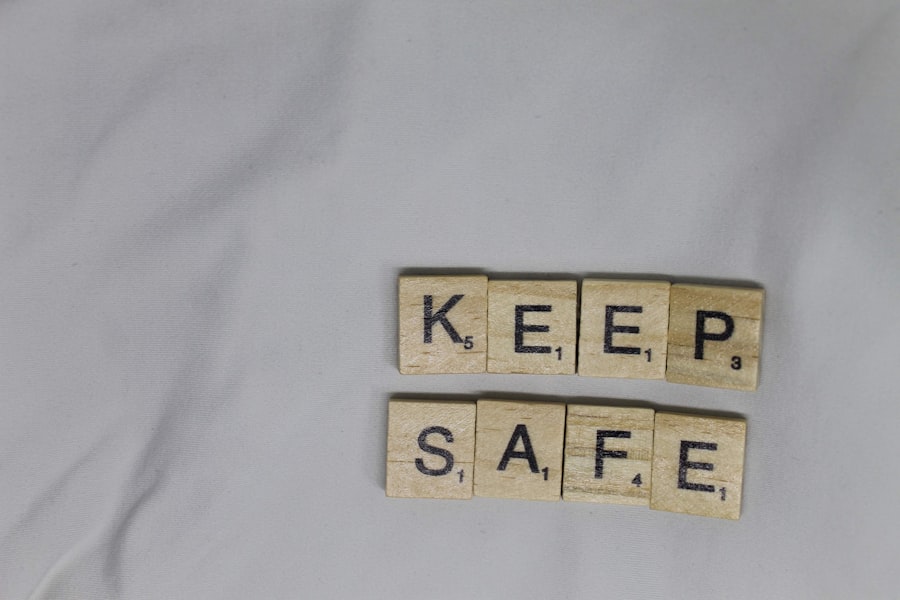Emotional safety is a fundamental aspect of any healthy relationship, whether it be romantic, familial, or platonic. It refers to the environment in which individuals feel secure enough to express their thoughts, feelings, and vulnerabilities without fear of judgment or retaliation. When you think about emotional safety, consider it as the invisible shield that protects your emotional well-being.
It allows you to be your authentic self, fostering open communication and deeper connections with those around you. Without this safety net, relationships can become fraught with misunderstandings, resentment, and emotional distance. To truly grasp the concept of emotional safety, you must recognize its components.
It encompasses trust, respect, and empathy. When you feel emotionally safe, you are more likely to share your innermost thoughts and feelings, knowing that they will be met with understanding rather than criticism. This sense of security is crucial for personal growth and the development of meaningful relationships.
By understanding emotional safety, you can begin to cultivate it in your interactions with others, creating a nurturing environment where everyone feels valued and heard.
Key Takeaways
- Emotional safety is the feeling of being able to express oneself without fear of judgment or harm.
- Emotional safety is crucial for healthy and fulfilling relationships.
- Creating a safe space for vulnerability involves active listening and empathy.
- Effective communication is essential for building emotional safety in relationships.
- Setting boundaries is important for maintaining emotional safety in relationships.
The Importance of Emotional Safety in Relationships
Emotional safety is not just a luxury; it is a necessity for healthy relationships. When you prioritize emotional safety, you create a foundation for trust and intimacy. This foundation allows both you and your partner to explore your feelings openly, leading to a deeper understanding of each other.
You may find that when you feel safe emotionally, you are more willing to take risks in sharing your thoughts and feelings, which can ultimately strengthen your bond. Moreover, emotional safety plays a critical role in conflict resolution.
When disagreements arise, having a safe space to express differing opinions can prevent escalation into hurtful arguments. You are more likely to approach conflicts with a mindset geared toward resolution rather than defensiveness when you feel secure. This ability to communicate openly during challenging times fosters resilience in relationships, allowing both parties to navigate difficulties together rather than apart.
Ultimately, emotional safety is the bedrock upon which lasting relationships are built.
Creating a Safe Space for Vulnerability

Creating a safe space for vulnerability requires intentional effort from both parties involved. It begins with establishing an atmosphere of trust and acceptance. You can start by actively listening to your partner without interrupting or judging their feelings.
This practice not only shows that you value their perspective but also encourages them to share more openly. When you create an environment where vulnerability is welcomed, you invite deeper conversations that can lead to greater intimacy and understanding. Additionally, it’s essential to model vulnerability yourself.
By sharing your own fears, insecurities, and emotions, you demonstrate that it’s okay to be imperfect and human. This reciprocal exchange fosters a sense of belonging and connection. You might find that when you allow yourself to be vulnerable, your partner feels empowered to do the same.
Together, you can build a sanctuary where both of you can express your true selves without fear of judgment or rejection.
Communicating Effectively to Build Emotional Safety
| Metrics | Results |
|---|---|
| Number of team members | 10 |
| Frequency of team meetings | Weekly |
| Feedback received from team members | Positive: 8, Negative: 2 |
| Number of conflicts resolved | 5 |
Effective communication is the cornerstone of emotional safety in any relationship.
When engaging in conversations, focus on understanding your partner’s perspective rather than simply waiting for your turn to speak.
This approach not only validates their feelings but also encourages them to reciprocate the same level of attentiveness when it’s your turn to share. Moreover, using “I” statements can significantly enhance the quality of your communication. Instead of saying, “You never listen to me,” try expressing how their actions make you feel: “I feel unheard when I’m trying to share my thoughts.” This shift in language reduces defensiveness and opens the door for constructive dialogue.
By prioritizing effective communication, you create an environment where both parties feel safe expressing their emotions and concerns.
Setting Boundaries for Emotional Safety
Setting boundaries is an essential aspect of maintaining emotional safety in relationships. Boundaries help define what is acceptable behavior and what is not, allowing both partners to feel respected and valued. You should take the time to reflect on your own needs and communicate them clearly to your partner.
This process involves being honest about your limits and what makes you feel comfortable or uncomfortable. It’s equally important to respect your partner’s boundaries as well. When both individuals honor each other’s limits, it fosters a sense of security that enhances emotional safety.
You may find that discussing boundaries openly can lead to deeper conversations about each other’s values and expectations in the relationship. By establishing clear boundaries together, you create a framework that supports mutual respect and understanding.
Healing from Past Emotional Wounds

Healing from past emotional wounds is crucial for fostering emotional safety in current relationships. If you carry unresolved pain from previous experiences, it can hinder your ability to connect with others fully. Acknowledging these wounds is the first step toward healing; it allows you to understand how they may impact your current interactions.
You might consider seeking professional help or engaging in self-reflection practices such as journaling or meditation to process these emotions. As you work through your past experiences, it’s essential to communicate with your partner about what you’re going through. Sharing your journey of healing can deepen your connection and foster empathy between you both.
Your partner may not fully understand what you’re experiencing, but by opening up about your struggles, you invite them into your healing process. This transparency can create a stronger bond built on trust and mutual support.
Building Trust and Security in Relationships
Trust is the bedrock of emotional safety; without it, relationships can become fragile and unstable. Building trust takes time and consistent effort from both partners. You can start by being reliable and following through on your commitments.
When you demonstrate that you can be counted on, it reinforces the idea that you are a safe person to rely on emotionally. Additionally, being honest and transparent in your communication fosters trust as well. When you share your thoughts and feelings openly, it encourages your partner to do the same.
You might find that engaging in regular check-ins about each other’s emotional states can help maintain this trust over time. By prioritizing trust-building activities in your relationship, you create a secure environment where both partners feel valued and understood.
Recognizing and Addressing Emotional Triggers
Emotional triggers are often rooted in past experiences and can significantly impact how you respond in various situations. Recognizing these triggers is essential for maintaining emotional safety in relationships. You may find it helpful to reflect on moments when you felt overwhelmed or reacted strongly; identifying patterns can provide insight into what triggers these responses.
Once you’ve recognized your triggers, it’s important to communicate them with your partner. Sharing this information allows them to understand your reactions better and provides an opportunity for them to support you during challenging moments. You might also consider developing coping strategies together for when triggers arise; this collaborative approach fosters a sense of teamwork in navigating emotional challenges.
Supporting Each Other’s Emotional Well-being
Supporting each other’s emotional well-being is vital for nurturing emotional safety in relationships. This support can take many forms, from simply being present during difficult times to actively encouraging each other’s personal growth. You should strive to be attuned to your partner’s emotional needs and offer assistance when they are struggling.
Moreover, celebrating each other’s successes is equally important for emotional well-being. Acknowledging achievements—big or small—can boost self-esteem and reinforce the bond between partners. By creating an environment where both individuals feel supported emotionally, you contribute to a healthier relationship dynamic that prioritizes mutual care and understanding.
Respecting Each Other’s Emotions and Feelings
Respecting each other’s emotions is fundamental for fostering emotional safety in any relationship. It involves acknowledging that both partners have valid feelings that deserve recognition and consideration. When your partner expresses their emotions, strive to listen without judgment or dismissal; this practice validates their experiences and reinforces their sense of security.
Additionally, it’s essential to avoid minimizing or invalidating each other’s feelings during conflicts or discussions. Instead of saying things like “You shouldn’t feel that way,” try responding with empathy: “I understand why you feel that way.” This shift in language demonstrates respect for their emotions and encourages open dialogue about feelings without fear of being belittled.
Nurturing Emotional Safety in Everyday Interactions
Nurturing emotional safety doesn’t have to be confined to significant conversations or moments; it can be woven into everyday interactions as well. Simple gestures like checking in on each other’s day or expressing appreciation can go a long way in reinforcing emotional safety within the relationship. You might find that small acts of kindness create an atmosphere of warmth and support that fosters deeper connections over time.
Moreover, practicing gratitude regularly can enhance emotional safety by reminding both partners of the positive aspects of their relationship. Taking time each day or week to express what you appreciate about each other cultivates an environment where both individuals feel valued and cherished. By incorporating these practices into daily life, you contribute to a lasting sense of emotional safety that strengthens the bond between partners.
In conclusion, emotional safety is an essential component of healthy relationships that requires ongoing effort from both parties involved. By understanding its importance, creating safe spaces for vulnerability, communicating effectively, setting boundaries, healing from past wounds, building trust, recognizing triggers, supporting each other’s well-being, respecting emotions, and nurturing everyday interactions, you can cultivate an environment where both partners feel secure and valued. Ultimately, prioritizing emotional safety leads to deeper connections and more fulfilling relationships.
Creating emotional safety in relationships is crucial for fostering trust and open communication between partners. An insightful article on this topic can be found on Unplugged Psychology, which delves into the importance of emotional safety and offers practical tips for nurturing it within your relationship. The article emphasizes the role of active listening, empathy, and setting healthy boundaries as foundational elements for creating a secure emotional environment. For more detailed guidance, you can read the full article by visiting Unplugged Psychology.
WATCH NOW! 😔 The Hidden Cost of Forced Positivity
FAQs
What is emotional safety in relationships?
Emotional safety in relationships refers to the feeling of being secure, supported, and accepted by your partner. It involves creating an environment where both partners feel comfortable expressing their thoughts, feelings, and needs without fear of judgment or rejection.
Why is emotional safety important in relationships?
Emotional safety is important in relationships because it fosters trust, intimacy, and connection between partners. When individuals feel emotionally safe, they are more likely to communicate openly, resolve conflicts constructively, and support each other through life’s challenges.
How can emotional safety be created in a relationship?
Emotional safety can be created in a relationship by practicing active listening, showing empathy and understanding, being non-judgmental, and respecting each other’s boundaries. It also involves being reliable, consistent, and supportive in times of need.
What are the signs of emotional safety in a relationship?
Signs of emotional safety in a relationship include open and honest communication, mutual respect, feeling comfortable being vulnerable, and a sense of security and trust in the relationship. Partners also feel valued, understood, and supported in an emotionally safe relationship.
What are the effects of lacking emotional safety in a relationship?
Lacking emotional safety in a relationship can lead to feelings of insecurity, anxiety, and mistrust. It can also result in communication breakdown, emotional distance, and an inability to address and resolve conflicts effectively. In extreme cases, it can lead to emotional abuse and the deterioration of the relationship.




